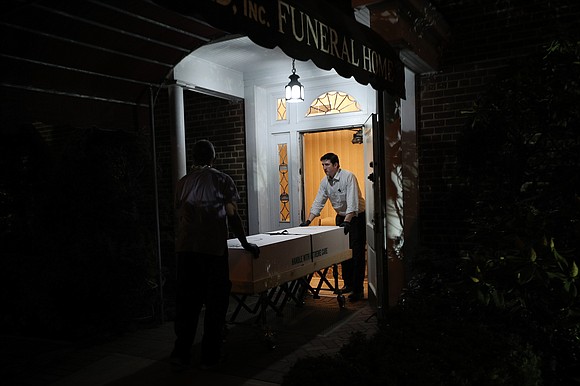Coronavirus model projects more than 317,000 US Covid-19 deaths by December
CNN/Stylemagazine.com Newswire | 8/28/2020, 11:02 a.m.

By Jay Croft, Jacqueline Howard and Jamie Gumbrecht, CNN
(CNN) -- A well-known coronavirus model previously cited by the White House forecasts more than 317,000 US deaths from Covid-19 by December.
As of Friday morning, the model from the Institute for Health Metrics and Evaluation at the University of Washington projects that 317,312 people may die from the illness -- marking an increase of about 8,000 deaths from a previous estimate the model projected one week ago.
Since January, US health authorities have identified more than 5 million cases nationwide, and more than 180,000 people have died, according to the latest data compiled by Johns Hopkins University.
The new IHME estimate suggests that the United States could see more than 136,000 additional deaths between now and December, and the daily death rate could rise to more than 2,000 per day.
Yet IHME researchers noted on their website on Thursday, when they updated their model, that "if mask wearing in public increases to 95%, more than 67,000 lives could be saved."'
Another forecast by the US Centers for Disease Control and Prevention puts the number of US deaths at 200,000 by September 19.
The projections published Thursday forecast 200,292 deaths by September 19, with a possible range of 195,824 to 207,269 deaths.
"State- and territory-level ensemble forecasts predict that the number of reported new deaths per week may decrease in 18 jurisdictions. Trends in numbers of future reported deaths are uncertain or predicted to remain stable in the other jurisdictions," the CDC says on its forecasting website.
Unlike some individual models, the CDC's ensemble forecast projects only about a month. The previous ensemble forecast, published August 20, projected roughly 195,000 coronavirus deaths by September 12.
Health officials 'concerned' about new testing guidelines
The National Association of County and City Health Officials and the Big Cities Health Coalition say they are "incredibly concerned with both the impact and the process" of the CDC's abrupt testing guidelines changes this week and urged in a letter sent on Friday that the CDC change course.
In a shift that perplexed many, the CDC changed its Covid-19 testing guidelines Monday to say some people without symptoms may not need to be tested, even if they've been in close contact with someone known to have the virus. Previously, the CDC said viral testing was appropriate for people with recent or suspected exposure, even if they were asymptomatic.
"Rather than empowering public health professionals and moving our nation forward in a cohesive way to address the pandemic, this abrupt change has caused confusion, consternation and undermined the credibility of the agency with public health professionals and the public alike," the letter says. "This revision and its resulting impact is adding yet another obstacle for public health practitioners to effectively address the pandemic."
The letter says that the lack of evidence cited to inform the changes has them "troubled," and changing testing guidance to suggest close contacts of those with confirmed Covid-19 do not need to be tested is "inconsistent with the science and the data."
Iowa tops some state-by-state rankings
The nation has averaged 41,991 new cases over the last seven days, down 10% from the previous week, according to the Johns Hopkins information.
Iowa has overtaken the top spot in the nation when it comes to the highest 7-day average of new cases per 100,000 people, the data show, with 31.49. It is followed by North Dakota, Mississippi, Alabama and South Dakota.
Iowa also reported a record high daily number of new cases, Johns Hopkins reports, with 2,681. It is followed by Minnesota, North Dakota and South Dakota.



